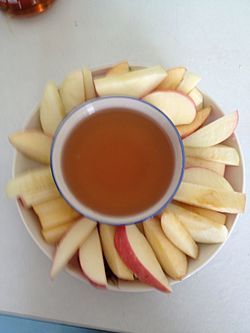Apples and honey facts for kids
 |
|
| Place of origin | Originally Israel, also Jewish diaspora |
|---|---|
| Serving temperature | Room temperature |
| Main ingredients | Apples, honey |
Apples and honey are a special food eaten by many Ashkenazi Jews during Rosh Hashanah. This holiday is the Jewish New Year. It marks the start of the High Holidays. Eating apples dipped in honey is a way to wish for a sweet and good year ahead.
Contents
The Story Behind Apples and Honey
The tradition of dipping apples into honey for Rosh Hashanah is very old. It likely started with the Ancient Israelites. This practice has been a part of Jewish celebrations for a long time. It helps people remember their history and hopes for the future.
How Apples and Honey Are Eaten
This dish is simple but full of meaning. It includes fresh, sliced apples served with a separate bowl of honey. Before eating, a special blessing is said in Hebrew. This prayer asks for a "Sweet New Year." After the blessing, a piece of apple is dipped into the honey and then eaten.
Dipping apples in honey is a custom, also known as a minhag. It is not a rule found in the main Jewish religious texts. These texts include the Tanakh or the Talmud. Instead, it is a beloved tradition passed down through generations.
Apples and Honey in American-Jewish Culture
In many English-speaking Ashkenazic schools, children learn about this tradition. Before Rosh Hashanah, young students often sing a fun song. It is called "Dip the Apple in the Honey." This song is sung to the tune of "Oh My Darling, Clementine." It helps kids remember the holiday and its sweet customs.
See Also

